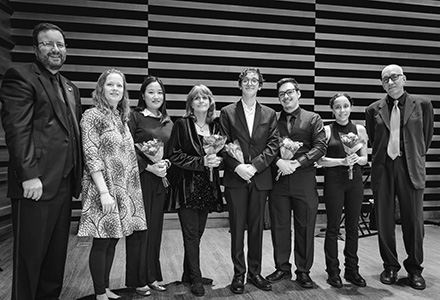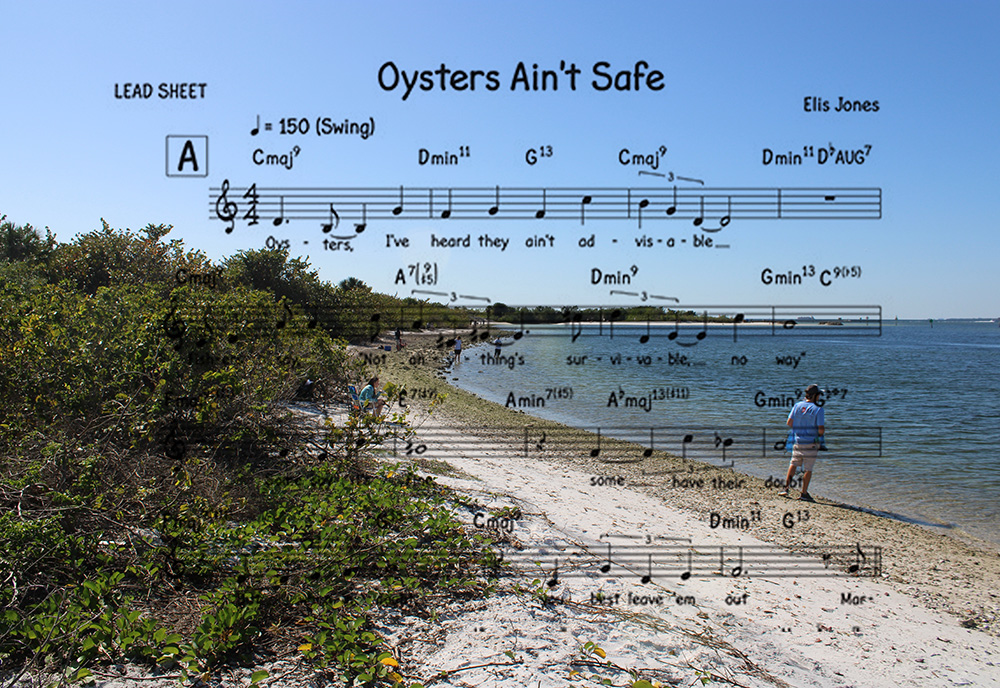By Sarah Sell, University Communications and Marketing
A team of professors, musicians and students at USF is transforming complicated environmental data into powerful music compositions.
After tackling critical issues such as harmful algae blooms and red tide, the group has now composed music that highlights the environmental stressors affecting oysters in Florida.
The interdisciplinary research examines how the state’s oyster populations have declined over time and explores the significant role oyster harvesting has played in supporting local economies, sustaining coastal ecosystems and shaping the state’s seafood industry.
You can listen to the new oyster-themed music here
Led by Assistant Professor of Anthropology Heather O’Leary, the project aims to make scientific data more accessible, understandable and engaging to the public.
Since launching the first set of musical compositions in 2024, O’Leary has been interviewed by international media outlets, spoken at environmental conferences and workshops, and recently won a prestigious award for her creative approach to science communications.
“To be able to harness the power of interdisciplinary thinking and include everyday members of the community in your scientific research is absolutely thrilling,” O’Leary said.
The CRESCENDO (Communicating Research Expansively through Sonification and Community-Engaged Neuroaesthetic Data Literacy Opportunities) project involves experts and scholars from various fields, with a primary focus on anthropology. It explores how people make sense of data in different cultural settings, working alongside music, oceanography, STEM education, art, journalism, hospitality and library sciences.

The first musical data team, following their 2024 performance, included: Matthew McCutchen, Heather O'Leary, Grace Oh, Carrie Clarke, Huron Falkenburt, Hunter Pomeroy, Elis Jones, and Paul Reller.
The unique collaboration began with the publication of a paper. O’Leary was the co-leader of a research team that found impacts of harmful algae blooms cost tourism-related businesses in Florida an estimated $2.7 billion from 2017 to 2019. The findings were significant, but the data was difficult to understand by non-experts.
Hoping to find a better way to involve the public in the scientific process, O’Leary began exploring creative approaches to data communication. She was inspired by her experience attending band concerts at USF and reached out to her colleague, Matt McCutchen, the director of bands in the College of Design, Art and Performance.
You can listen to Sanctuary and Flow here
Together, they collaborated with a team of student composers who transformed the data into music titled "Sanctuary" and "Cardinal Flow." The music was performed by the university’s Symphonic Band & Wind Ensemble on Feb. 6, 2024, at USF Concert Hall.
Building on the momentum of her earlier work, O’Leary continued to expand CRESCENDO by focusing on Florida’s declining oyster populations. Challenges to this vital species stem from overharvesting, habitat loss, reduced freshwater flow and environmental stressors such as red tide and PFAS, commonly known as “forever chemicals.”
Utilizing oyster population data over the last four decades from the Florida Fish and Wildlife Conservation Commission, along with O’Leary’s own survey results from the USF-led Tampa Bay Surveillance Project, a student composer who created the first two musical pieces developed a sonification titled “Oysters Ain’t Safe.”
The jazz piece brings together a trio of themes: people, planet and profit, which represents a balanced approach to sustainability. For the first time in CRESCENDO, it draws on people’s survey responses to shape the composition. The piece reflects both the public’s reluctance to eat oysters and the oysters’ vulnerability in the face of multiple threats.
This second phase of the project not only expanded its scientific focus but also continued to gain recognition for its innovative approach to public engagement.
In June, O’Leary won a national award from the Society for Economic Anthropology (SEA). The Kate Browne Creativity in Research Award celebrates creative and engaged economic anthropology.
“The CRESCENDO group of students, scholars, musicians and artists [O’Leary has] brought together is pushing the boundaries of interdisciplinary work into a new aesthetic: the sonification of research. The imaginative scope and deeply collaborative nature of this work is wildly ambitious and succeeds on multiple levels,” said Browne, a social scientist, film producer and emeritus professor of anthropology and geography at Colorado State University.
The project goes beyond just sonification, with sheet music, student-created artwork, a music video and an augmented reality experience that will soon be available to the public. The next USF concert, featuring the oyster-themed music, takes place in January 2026.
“I thought CRESCENDO might be a little too far outside the box, but I had a strong idea and an exceptional team of USF faculty and students,” O’Leary said. “As an interdisciplinary researcher, you sometimes wonder if you’ve gone too far from your designated field, so seeing the project come together and be recognized internationally and also embraced by my field was really gratifying.”
